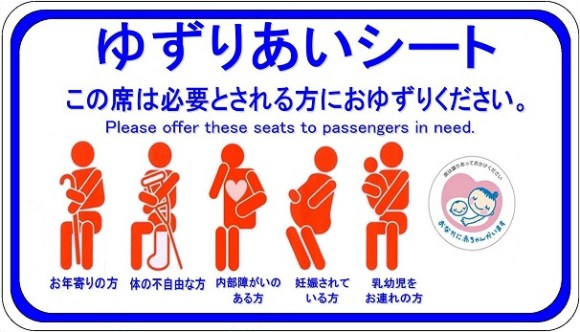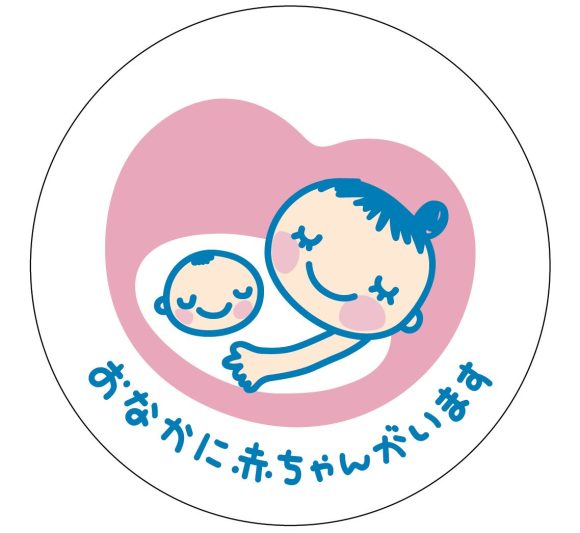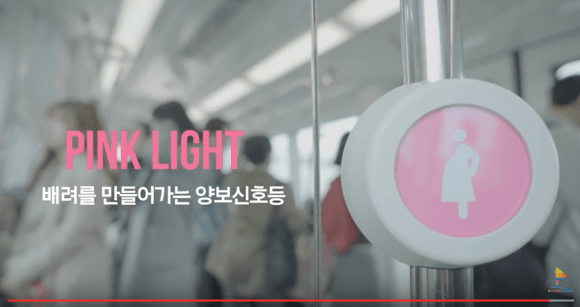
The bluetooth system has been designed to help pregnant women secure a seat on the train.
For such a polite and thoughtful society, one thing that often baffles visitors to Japan is the reluctance of passengers to relinquish their seats on the train. There may be several explanations for this, related to societal rules which respect order in regards to queues, and the fact that elderly passengers who dislike having the “old” tag slapped on them have berated schoolchildren for giving up their seats for them. However, when it comes to pregnant women, seated passengers should know to give up their seats as a common courtesy.
▼ Despite this request in the priority seat sections of train carriages in Japan, it’s never guaranteed that anyone will give up their seat.
To make sure people are aware of their condition, expectant mothers wear a pink-and-white “Baby on Board” keychain given to them by their local clinics and also available from train station offices. Despite standing in the priority seat section and prominently displaying the keychains on their bags, however, it’s never a certainty that someone will be nice enough to give up their seat for them.
▼ According to a 2014 survey, more than 60 percent of Japanese men said they had never heard of the “Baby on Board” maternity mark badges.
Considering all these factors, the new “Pink Light” system trialled in South Korea recently might be a perfect fit for the Japanese transportation network. The set-up requires women to carry a sensor that sends a wireless signal which activates a pink light located in the priority seat section, alerting passengers to the fact that there’s a pregnant woman nearby. The non-waterproof pendant sensor has a battery-life of at least six months and works best when carried outside of pockets, which makes them better suited to being used on bags.
▼ There’s no excuse for not knowing what this symbol represents.
The system, which was tested over a five-day period in the city of Busan by 500 pregnant women, came about as a joint collaboration between local businesses and the city council, with the Mayor, Suh Byung-soo, expressing his support for the comfort and care of pregnant women using local transport. The viability of the project and its future remains under wraps for now, but with a dedicated website and pendant applications forms currently available online, we hope to see this project expand to other countries like Japan in the near future.
To see exactly how the system works, take a look at the short video below.
Source: Pink Light, BBC News
Top Image: YouTube/Dynamic Busan
Insert Images: Transportation Bureau (City of Yokohama), Mokosoft, YouTube/Dynamic Busan
[ Read in Japanese ]




 Messaging app LINE experiments with service to help pregnant women find seats on trains
Messaging app LINE experiments with service to help pregnant women find seats on trains Should healthy young men sit in Japanese trains’ priority seats for the elderly and pregnant?
Should healthy young men sit in Japanese trains’ priority seats for the elderly and pregnant? Video of foreign diplomat riding in Tokyo subway priority seat sparks manners debate【Video】
Video of foreign diplomat riding in Tokyo subway priority seat sparks manners debate【Video】 10 times Japanese train passengers aren’t so polite【Survey】
10 times Japanese train passengers aren’t so polite【Survey】 Tokyo government teams up with Japanese rapper to promote roller coaster subway system【Video】
Tokyo government teams up with Japanese rapper to promote roller coaster subway system【Video】 Yakuzen ramen restaurant in Tokyo is very different to a yakuza ramen restaurant
Yakuzen ramen restaurant in Tokyo is very different to a yakuza ramen restaurant Osaka establishes first designated smoking area in Dotonbori canal district to fight “overtourism”
Osaka establishes first designated smoking area in Dotonbori canal district to fight “overtourism” Japan’s cooling body wipe sheets want to help you beat the heat, but which work and which don’t?
Japan’s cooling body wipe sheets want to help you beat the heat, but which work and which don’t? Adorable Totoro acorn key holders come with a special guest hidden inside[Photos]
Adorable Totoro acorn key holders come with a special guest hidden inside[Photos] Highest Starbucks in Japan set to open this spring in the Tokyo sky
Highest Starbucks in Japan set to open this spring in the Tokyo sky Skyscraper sized Pokémon cards to appear in Tokyo all year long in Tocho projection mapping event
Skyscraper sized Pokémon cards to appear in Tokyo all year long in Tocho projection mapping event New smartphone game turns car models into anime girls with model-worthy looks
New smartphone game turns car models into anime girls with model-worthy looks Japanese photo studio lets parents transform their kid into Baby Super Mario from Yoshi’s Island
Japanese photo studio lets parents transform their kid into Baby Super Mario from Yoshi’s Island Foreign tourists in Japan will get free Shinkansen tickets to promote regional tourism
Foreign tourists in Japan will get free Shinkansen tickets to promote regional tourism Coffin meditation sessions being offered by Tokyo relaxation parlor
Coffin meditation sessions being offered by Tokyo relaxation parlor The 10 most annoying things foreign tourists do on Japanese trains, according to locals
The 10 most annoying things foreign tourists do on Japanese trains, according to locals Starbucks Japan releases new sakura goods and drinkware for cherry blossom season 2026
Starbucks Japan releases new sakura goods and drinkware for cherry blossom season 2026 Naruto and Converse team up for new line of shinobi sneakers[Photos]
Naruto and Converse team up for new line of shinobi sneakers[Photos] Is Sapporio’s Snow Festival awesome enough to be worth visiting even if you hate the snow? [Pics]
Is Sapporio’s Snow Festival awesome enough to be worth visiting even if you hate the snow? [Pics] Japan has trams that say “sorry” while they ride around town…but why?
Japan has trams that say “sorry” while they ride around town…but why? Sakura Totoro is here to get spring started early with adorable pouches and plushies
Sakura Totoro is here to get spring started early with adorable pouches and plushies Starbucks Japan unveils new sakura Frappuccino for cherry blossom season 2026
Starbucks Japan unveils new sakura Frappuccino for cherry blossom season 2026 Poop is in full bloom at the Unko Museums for cherry blossom season
Poop is in full bloom at the Unko Museums for cherry blossom season Now is the time to visit one of Tokyo’s best off-the-beaten-path plum blossom gardens
Now is the time to visit one of Tokyo’s best off-the-beaten-path plum blossom gardens Playing Switch 2 games with just one hand is possible thanks to Japanese peripheral maker
Playing Switch 2 games with just one hand is possible thanks to Japanese peripheral maker Japan’s newest Shinkansen has no seats…or passengers [Video]
Japan’s newest Shinkansen has no seats…or passengers [Video] Foreigners accounting for over 80 percent of off-course skiers needing rescue in Japan’s Hokkaido
Foreigners accounting for over 80 percent of off-course skiers needing rescue in Japan’s Hokkaido Super-salty pizza sends six kids to the hospital in Japan, linguistics blamed
Super-salty pizza sends six kids to the hospital in Japan, linguistics blamed Take a trip to Japan’s Dododo Land, the most irritating place on Earth
Take a trip to Japan’s Dododo Land, the most irritating place on Earth Archfiend Hello Kitty appears as Sanrio launches new team-up with Yu-Gi-Oh【Pics】
Archfiend Hello Kitty appears as Sanrio launches new team-up with Yu-Gi-Oh【Pics】 Survey asks foreign tourists what bothered them in Japan, more than half gave same answer
Survey asks foreign tourists what bothered them in Japan, more than half gave same answer Japan’s human washing machines will go on sale to general public, demos to be held in Tokyo
Japan’s human washing machines will go on sale to general public, demos to be held in Tokyo Starbucks Japan releases new drinkware and goods for Valentine’s Day
Starbucks Japan releases new drinkware and goods for Valentine’s Day We deeply regret going into this tunnel on our walk in the mountains of Japan
We deeply regret going into this tunnel on our walk in the mountains of Japan Studio Ghibli releases Kodama forest spirits from Princess Mononoke to light up your home
Studio Ghibli releases Kodama forest spirits from Princess Mononoke to light up your home Major Japanese hotel chain says reservations via overseas booking sites may not be valid
Major Japanese hotel chain says reservations via overseas booking sites may not be valid Put sesame oil in your coffee? Japanese maker says it’s the best way to start your day【Taste test】
Put sesame oil in your coffee? Japanese maker says it’s the best way to start your day【Taste test】 No more using real katana for tourism activities, Japan’s National Police Agency says
No more using real katana for tourism activities, Japan’s National Police Agency says Four things our new-mother reporter felt riding the Tokyo subway with her baby
Four things our new-mother reporter felt riding the Tokyo subway with her baby 10 types of people Japanese women hate sitting next to on public transportation【Video】
10 types of people Japanese women hate sitting next to on public transportation【Video】 42 reasons why we love riding the rails in Japan
42 reasons why we love riding the rails in Japan